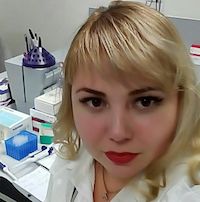Tardive Dyskinesia Biomarkers Found in Blood Serum
Brain-derived neurotrophic factor, interleukin 6, and S100-beta concentration levels were consistent in tested TD patients.

Anastasiia S. Boiko, MD, PhD
Blood serum test results have identified 3 potential biomarkers of tardive dyskinesia (TD) in infected patients.
Researchers from Russia and the Netherlands reported that there were consistent correlations in brain-derived neurotrophic factor (BNDF), interleukin 6 (IL-6), and S100-beta concentration levels and patients with TD.
The study — led by Anastasiia S. Boiko, MD, PhD, a researcher in the Laboratory of Molecular Genetics and Biochemistry at the Mental Health Research Institute at the Tomsk Research Medical Center of the Russian Academy of Sciences (NMRC) — observed blood serum levels of patients with and without TD to observe any endocrine, neurotrophic, and immunological markers of the movement disorder in patients with schizophrenia on antipsychotic therapy.
TD, a neurological disorder, is induced by dopamine receptor blocking agents, which are often found in therapies for psychiatric and gastrointestinal conditions. Schizophrenia patients are susceptible to the disease due to adverse effect of antipsychotic treatments.
Boiko and researchers noted that “dysregulations in immune, hormonal, and neurotrophic systems” have been considered possible underlying mechanisms of oxidative stress-related indirect pathway neurotoxicity. Though TD’s pathology is not yet fully understood, previous research has indicated this neurotoxicity may be connected to it.
“Principle aims of translational psychiatric research are searching for biomarkers which can be used to diagnose pathological biochemical processes and to identify molecular targets for treatment as well as development of pharmacogenetic approaches to personalize this therapy,” researchers wrote.
Study participants were recruited from psychiatric hospitals, with TD being assessed cross-sectionally though the Abnormal Involuntary Movement Scale (AIM). Blood serum was tested for BDNF, IL-6, S100-beta, cytokine, cortisol, and interferon gamma levels, with results expressed as median and quartile intervals, or mean and standard deviation. Differences were considered significant at p being greater than or equal to 0.05.
In the 180 participating patients with schizophrenia treated by long-term antipsychotic therapy, 128 (71%) were male and 52 (29%) were female. Through AIMS, just 71 (39%) had been diagnosed with TD. They were divided from the 109 (61%) patients without the condition for testing.
There was an increase (p=0.05) in IL-6 concentration (5.69 [3.55; 7.4] pg/ml) and S100-beta concentration (85.29±5.53 ng/L [p=0.06]) in patients with TD, versus patients without.
Researchers also found a significant (p=0.04) decrease in BDNF concentration for patients with TD (1.9 [1.01;2.99] ng/ml) versus patients without it (2.66 [1.29; 3.89] ng/ml). No other measured potential biomarkers reported significant differences among the 2 patient groups.
With consideration to the findings, researchers surmised that the biological process of TD development may not be entirely confined to patients’ brains.
“Hormonal and immune systems are also involved, which may be related to these systems being closely interrelated,” researchers wrote.
There’s also indication from the results that risk factors could identified in patients prior to a TD diagnosis.
“Identifying markers that can be used as diagnostics or predictors of treatment response in people with tardive dyskinesia will be an important step towards being able to provide personalized treatment,” researchers wrote.
Boiko and researchers involved in the study did not return request for comment at the time of publication.
The study, "Potential Biomarkers Of Tardive Dyskinesia: A Multiplex Analysis Of Blood Serum," was presented at the 30th European College of Neuropsychopharmacology Congress in Paris, France.
Related Coverage
Ingrezza Improves TD Symptoms In Year-long Extension
Novel Treatments for Schizophrenia Reduce Symptoms and Adverse Effects